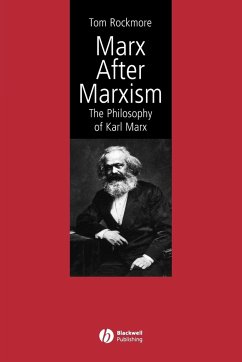Marx After Marxism encourages readers to understand Karl Marx in new ways, unencumbered by political Marxist interpretations that have long dominated the discussions of both Marxists and non-Marxists. This volume gives a broad and accessible account of Marx s philosophy and emphasizes his relationship to Hegel.
Hinweis: Dieser Artikel kann nur an eine deutsche Lieferadresse ausgeliefert werden.
Hinweis: Dieser Artikel kann nur an eine deutsche Lieferadresse ausgeliefert werden.
"After a period of drought in serious Marx scholarship, thepublication of Rockmore's book, at once so well informed and soinformative in both philosophical and historical terms, is a markerevent. It makes a strong and clear case, by means of a carefulsurvey of Marx's own texts, for resituating him in the tradition ofGerman idealism and separating him from the accrued excess baggageof later 'Marxisms." William L. McBride, Purdue University
"The decline of communism has been accompanied by a decline ininterest in Marx. Rockmore's Marx After Marxism is thebeginning of a new assessment of Marx that will help reverse thattrend. The book's overall stance concerns what Marx got out ofHegel at different times in his own development. Rockmore alsogives a fine account of Marx's main work in political economy,especially the central ideas of Capital; this is where anyMarx revival should focus in providing a critique of our ownsociety." Robert Nola, University of Auckland
"The decline of communism has been accompanied by a decline ininterest in Marx. Rockmore's Marx After Marxism is thebeginning of a new assessment of Marx that will help reverse thattrend. The book's overall stance concerns what Marx got out ofHegel at different times in his own development. Rockmore alsogives a fine account of Marx's main work in political economy,especially the central ideas of Capital; this is where anyMarx revival should focus in providing a critique of our ownsociety." Robert Nola, University of Auckland








